- Home
- Steven Harper
The Dragon Men ce-3
The Dragon Men ce-3 Read online
The Dragon Men
( Clockwork Empire - 3 )
Steven Harper
Steven Harper
The Dragon Men
THE STORY SO FAR
Once again, we feel it necessary to pause our thrilling narrative to catch our readers up. Friends familiar with events in The Doomsday Vault and The Impossible Cube should immediately flip to chapter one and begin there. Those who have not read those most excellent and fascinating volumes are discreetly encouraged to find and peruse them forthwith.
However, should those books (enthralling though they are) be unavailable, or should the gentle reader simply need a reminder about the various events leading up to the ones in this volume, the following information may prove useful.
In 1750, a new plague entered the world. Most who caught it died of fever and respiratory distress. Those few who survived this stage were often left crippled or scarred. A great number experienced dementia, loss of muscle tone, photosensitivity, and thinning of the skin, which led to open sores and necrotic tissue. These unfortunates were inevitably dubbed plague zombies, and they lurched through towns and cities, spreading the disease even further.
However, for perhaps one plague victim in a hundred thousand, the disease made the brain come together instead of fly apart. For these rare people, fields of study such as physics, mathematics, biology, and even art became simplicity itself. They created wonderful and terrifying inventions with the power to touch tiny microbes or rend the world in two. These men and women became known as clockwork geniuses or clockworkers. Unfortunately, their grip on reality inevitably slipped, and they thought nothing of destroying human life, or even the entire world, in the pursuit of their own experiments. Within three years of contracting the plague-often sooner-each one went utterly mad and died, allowing others to rise.
Most countries feared plague zombies and clockworkers, but China and the British Empire cheerfully set about harvesting the latter, using their inventions to divide the world between the empires. The delicate balance of power was maintained by England’s captive clockworkers and China’s hidden force of Dragon Men, which is the name by which clockworkers were known in Asia.
As a precautionary measure, the British Crown created the Third Ward, an underground police force dedicated to hunting down clockworkers anywhere in the world and bringing them back to London, where they were sequestered in hidden laboratories and encouraged to create their fantastic inventions for the benefit of the Empire. One of the more notorious examples was a German clockworker named Dr. Clef, who created a device known as the Impossible Cube, with which he could manipulate time itself.
The Third Ward worked hard and in secret to maintain the balance of power between the two world empires. After all, with balance comes peace. However, recent events have threatened this balance.
In 1842, England managed to gain a distinct advantage through a conflict that eventually became known as the First Opium War. In the aftermath of this conflict, England forced China into a number of trade concessions that severely damaged China’s economy. Most notably, British merchants were now allowed to sell their (much cheaper) goods to Chinese buyers. The conflict also demonstrated to China that when it came to war, the British clockworkers had gained a definite edge over the Dragon Men. By 1857, China’s economy had only recently begun to recover.
It was then that Gavin Ennock and Alice, Lady Michaels, accidentally destroyed the British Empire.
Perhaps accidentally is too strong a word. The destruction was actually more of a side effect. The reader must understand that, for reasons detailed in that most compelling of books, The Doomsday Vault, Gavin became infected with the clockwork plague, and Alice learned that the Third Ward, fearing an upset in the balance of world power, had locked the cure away in that eponymous repository. The only way to save Gavin’s life was to steal the cure from the Doomsday Vault.
This Alice and Gavin did quite handily. In the process, Gavin destroyed Dr. Clef’s Impossible Cube (much to that clockworker’s chagrin), and Alice found herself in possession of an iron gauntlet that used her own blood to cure plague victims. Recipients would also spread the cure each time they coughed or sneezed, allowing the cure to diffuse more quickly.
Unfortunately, this meant the end of British clockworkers and the end of new clockworker inventions. In the four or five years it would take for the cure to spread to Asia, China would gain an insurmountable advantage over Britain and forever rule the world.
With no more clockworkers to hunt or guard, it was also the end of the Third Ward.
All this meant very little to Alice Michaels and Gavin Ennock, for the cure had one catch-it didn’t help clockworkers. And Gavin turned out to be one of the few.
While the clockwork plague elevated Gavin’s intelligence and eroded his sanity, Alice determined that if the Third Ward held a secret cure for plague zombies, China’s Dragon Men might have one for clockworkers. Alice and Gavin fled across Europe toward China in the Lady of Liberty, Gavin’s own airship. Joining them were Dr. Clef and a clockwork cat named Click. Pursuing them with the intent of bringing them to justice was Lieutenant Susan Phipps, at one time the head of the Third Ward and more recently out of a job.
During an eventful stop in Luxembourg for events chronicled in a delightful book titled The Impossible Cube, Gavin heard an astonishing rumor that his father, thought long dead, might still be alive, and Alice heard a dreadful prediction that if she didn’t let Gavin go, the world would perish in flood and plague.
When the group arrived in Kiev mere steps ahead of Lieutenant Phipps, Dr. Clef managed to open a portal through time and reach backward through the time-stream to snatch his Impossible Cube at the moment it was destroyed. A related outcome would also have destroyed the entire universe, a possibility which caused everyone concerned a certain amount of alarm. Alice and Gavin did manage to stop him, but only at great personal cost.
Unfortunately, the time portal, which proved deadly to all who touched it, remained open and was drawing Alice and Gavin in. They were rescued at the last moment by Lieutenant Phipps, who had come to realize saving millions of actual lives from the clockwork plague took precedence over her perceived duty to the British Empire. Once the consternation of the near destruction of the universe faded, Phipps insisted on accompanying Gavin and Alice to China and on helping them spread the cure along the way.
The clockwork plague continues its terrible march through Gavin’s mind, and time is running short. Dr. Clef once estimated Gavin had at most three or four months to live, and their journey to China would take a minimum of ninety days. Gavin might, of course, go mad and die much sooner.
Meanwhile, the Impossible Cube sits in a cupboard aboard the Lady of Liberty while Gavin pilots the ship to China and Alice prays they make it in time.
We also wish to let the reader know that when transliterating Chinese into English, it is customary in some circles (including this one) to render the sh sound with a q or an x. Therefore Qing is pronounced shing and Qilin is pronounced sheelin, while Xianfeng is sheeanfeng and Cixi is keeshee. Why transliterators use a q or x instead of the more straightforward sh, we cannot hazard a guess, beyond the possibility that both letters simply look smashing.
Chapter One
“I still think this is a terrible idea,” said Alice.
Gavin spread his mechanical wings, furled them, and spread them again. He shrugged at Alice’s words and shot a glance across the deck at Susan Phipps, who set her jaw and tightened her grip on the helm. Her brass hand, the one with six fingers, gleamed in the afternoon sun, and a stray flicker of light caught Gavin in the face. The world slowed, shaving time into transparent slices, and for one of them he felt trillions of photons ricochet off his s
kin and carom away in rainbow directions. His mind automatically tried to calculate trajectory for them, and the numbers spun in an enticing whirlpool. He bit his lip and forced himself out of it. There were more important-more exciting-issues at hand.
“I completely agree,” Phipps said. A brass-rimmed monocle with a red lens ringed her eye. “But he’s the captain of the ship, and he can do as he likes, even if it’s idiotic.”
“Captains are supposed to listen to common sense,” Alice replied in tart British tones. “Especially when the common sense comes from someone with a decent amount of intelligence.”
At that Gavin had to smile. A soft breeze spun itself across the Caspian Sea, winding across the deck of the Lady of Liberty to stir his pale blond hair. He started to count the strands that flicked across his field of vision, noted the way each one was lifted by the teamwork of gas particles, then bit his lip again. Damn it, he was becoming more and more distractible by minutiae. More and more individual details of the world around him beckoned-the drag of the harness on his back, the creak of the airship’s wooden deck, the borders of the shadow cast by her bulbous silk envelope high overhead, the sharp smell of the exhaust exuded from the generator that puffed and purred on the decking, the gentle thrumming of the propellered nacelles that pushed the Lady smoothly ahead, the shifting frequency of the blue light reflected by the Caspian Sea gliding past only a few yards beneath the Lady’s hull. Sometimes the world seemed a jigsaw puzzle of exquisite jewels, and he needed to examine each piece in exacting detail.
“Gavin?” Alice’s worried voice came to him from far away, and it yanked him back to the ship. “Are you there?”
Damn it. He forced the grin back to full power. “Yeah. Sure. Look, I’ll be fine. Everything’ll work. I’ve been over the machinery a thousand times, and I’ve made no mistakes.”
“Of course not.” Alice’s expression was tight. “Clockworkers never make mistakes with their inventions.”
Gavin’s grin faltered again, and he shifted within the harness. She was worried about him, and that both thrilled and shamed him. It was difficult to stand next to her and not touch her, even to brush against her. Just looking at her made him want to sweep her into his arms, something she allowed him to do only sporadically.
“Alice, will you marry me?” he blurted out.
She blinked at him. “What?”
“Will you marry me?” Words poured out of him. “I started to ask you back in Kiev, but we got interrupted, and what with one thing and another, I never got the chance to ask again, and now there’s a small chance I’ll be dead, or at least seriously wounded, in the next ten minutes, so I want to know: Will you marry me?”
“Oh good Lord,” Phipps muttered from the helm.
“I–I. . Oh, Gavin, this isn’t the time,” Alice stammered.
He took both her hands in his. Adrenaline thrummed his nerves as if they were cello strings. Alice’s left hand was covered by an iron spider that wrapped around her forearm, hand, and fingers to create a strange metal gauntlet, and the spider’s eyes glowed red at his touch. Gavin had his own machinery to contend with-the pair of metal wings harnessed to his back. They flared again when he shifted his weight.
“The universe will never give us the right time.” Gavin’s voice was low and light. “We have to make our own.”
“Dr. Clef tried to make time,” Alice said, “and look where it got him.”
“He wanted to keep it for himself.” Gavin looked into Alice’s eyes. They were brown as good clean earth, and just as deep. “We’ll share it with the world. I can’t offer you more than the open sky and every tune my fiddle will play, but will you marry me?”
“There’s no minister. Not even a priest!”
“So you’re saying you don’t want to.”
She flushed. “Oh, Gavin. I do, yes, I do. But-”
“No!” He held up a hand. “No yes, but. Just yes. And only if you mean it.”
“Ah. Very well.” Alice, Lady Michaels, took a deep breath. Her dress, a piece of sky pinned by the breeze, swirled about her. “Yes, Gavin. I will marry you.”
With a shout of glee, Gavin leaped over the edge.
Air tore past his ears, and his stomach dropped. The Lady’s hull blurred past him, and only two dozen yards below, the calm Caspian Sea shimmered hard and sharp and a little angry. Gavin spread his arms, moved his shoulders, and the wires attached to his body harness drew on tiny pulleys. The wings snapped open. The battery pack between his shoulder blades pulsed power, and blue light coruscated across the wings with a soft chime like that of a wet finger sliding over a crystal goblet. A matching blue light current glowed through a lacy endoskeleton underneath the Lady’s envelope above, giving her a delicate, elegant air. The endoskeleton and the wings were fashioned from the same alloy, though the wings consisted of tiny interwoven links of metal, much like chain mail. And when electricity pulsed through the alloy-
Gavin dove toward the water a moment longer, until the glow and the chime reached the very tips of his wings. In that moment, the alloy pushed against gravity itself, and abruptly he was swooping back up, up, and up, and by God he was rising, climbing, ascending, flying, and the wind pushed him higher with an invisible hand, and the deck with Alice and Phipps upon it flashed by so fast, Gavin barely had time to register their surprised expressions, and then the Lady’s curli-blue envelope plunged toward him like a whale falling onto a minnow, and the wind tore his surprised yell away as a sacrifice, giving him just enough time to twist his body and turn the unfamiliar flapping wings-God, yes, they were wings-so that he skimmed up the side of the envelope so close, his belly brushed the cloth, and with dizzying speed he was above the ship, looking down at her sleek envelope and her little rudder at the back and the fine net of ropes that cradled the ship like soft fingers, and his body stretched in all directions with nothing below or above him. Every bit of his spirit rushed with exhilaration, flooded with absolute freedom. His legs in white leather and his feet in white boots hung beneath him, deliciously useless. His muscles moved, and the wings, made of azure light, flapped in response, lifting him into the cool, damp air, with bright brother sun calling to him, lifting body and soul. A rainbow of power gushed through him, and he was part of the heavens themselves, a whole note streaking through infinity, cleansed by wind and mist and shedding worries like grace notes. Gavin yelled and whooped, and his voice thundered across distant clouds as if it might split them in two. This was what he’d been born for. This was home.
He hung in the blue nothing for a tiny moment. His wings glowed and sang softly behind him. The clouds spread a cottony pasture far away, and he could almost-almost-see gods and angels striding across them. A calm stole over him. It didn’t matter how many trillions of particles held him aloft or how gravity failed to function. It didn’t matter that a disease was coursing through his body and killing him bit by bit. Here was blessed nothing. His mind slowed and joined the stillness. The wind sighed, and Gavin hummed a soft note in response as the breeze curled about his white-clad body. Harmony. Peace. How perfect it was here.
A shadow below caught his eye. The Lady was still hovering just above the surface of the calm Caspian Sea. This was at Phipps’s insistence-if Gavin’s wings had failed, he wouldn’t have fallen far, and the ocean would have provided a more pleasant landing than hard ground. Perhaps five miles ahead of the ship lay a sliver of an island, and just beyond that, a rocky coast. The shadow was moving beneath the water, growing larger and larger beneath the Lady as whatever cast it moved up from the bottom of the sea. The thing was nothing natural. Unease bloomed quickly into concern and fear. Gavin tucked and dove, his wings pulled in tightly. He didn’t dare dive too quickly-he didn’t know how much the harness could take, even though his mind was automatically calculating foot pounds and stress levels. He shouted a warning to Alice and Phipps and felt the vibration of his vocal cords, sensed the compression of air, knew the sound would scatter helplessly long before it reached Alice’s e
ardrums, and still he shouted.
Half a mile below him, a pair of enormous black tentacles rose up from the shadow and broke the surface of the water. At seven or eight feet thick, they easily looped themselves up and around the Lady with incredible speed, even though she was the size of a decent cottage. Fear chased Gavin’s heart out of his rib cage as he dove closer. He could hear Alice shrieking and Phipps yelling in thin, tinny voices that were ballooning into full volume. Air burned his cheeks as he dove past the envelope, now wrapped in suckered black flesh, and he caught the rank smell of ocean depths and old fish.
Instinct rushed him ahead. He had to reach Alice. He had no other thought but to reach her, get her to safety. Even the Lady’s distress didn’t matter.
Below and just behind the ship, a black island rose from the waves. Eight other tentacles trailed in oily shadows beneath the ship, and a wicked horned beak large enough to crack an oak tree snapped open and shut. A single eye the size of a stagecoach stared up at Gavin, and he caught his own reflection in the dark iris. Inside Gavin, a monster equal to the one below him roared its anger. For a mad moment, he wondered if he could dive into the eye, punch both fists straight through the cornea into vitreous goo, and force the creature away. Grimly, he ended that line of thought as foolish. Instead, he made himself fling his wings open and end the dive with a sharp jerk that sent a red web of pain down his back and into his groin, where the flight harness was strapped to his lower body. He skimmed through a gap in the tentacles and the rope web that supported the Lady’s hull, twisting his body in ways that were already becoming reflexive, until he could drop to the deck. His wings folded back into a metallic cloak that dragged at his back and shoulders once the blue glow faded and the chime stopped.
Susan Phipps had drawn a cutlass of tempered glass-only fools used sparking metal on an airship-and was hacking at one of the loops of tentacle that encircled the ship in a rubbery tunnel. Her mouth was set in a hard line, and her graying black hair was coming loose from under her hat and spilling over her blue lieutenant’s uniform. The blade gleamed liquid in the sun and it distorted the black tentacle as Phipps slashed again and again, but the edge made only shallow cuts in the rubbery surface, and if the creature noticed, it gave no indication.

 The Importance of Being Kevin
The Importance of Being Kevin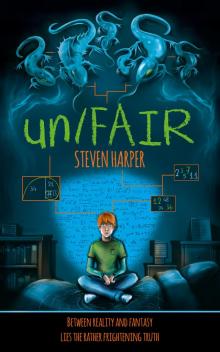 un/FAIR
un/FAIR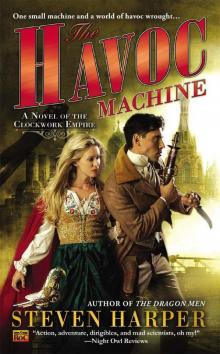 The Havoc Machine
The Havoc Machine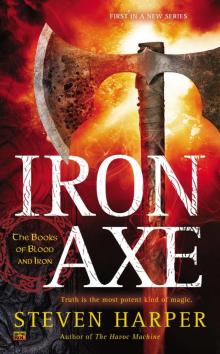 Iron Axe
Iron Axe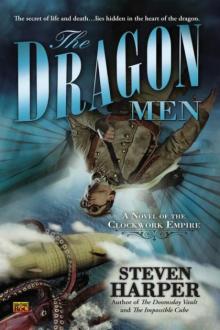 The Dragon Men
The Dragon Men The Doomsday Vault ce-1
The Doomsday Vault ce-1 The Doomsday Vault
The Doomsday Vault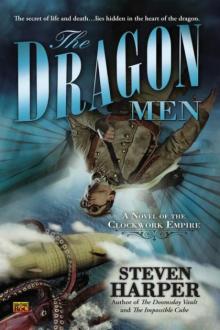 The Dragon Men ce-3
The Dragon Men ce-3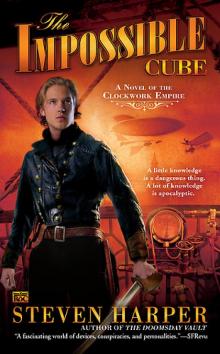 The Impossible Cube
The Impossible Cube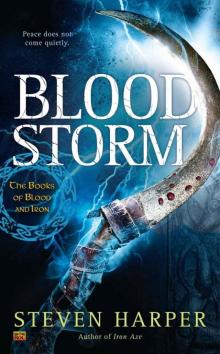 Blood Storm: The Books of Blood and Iron
Blood Storm: The Books of Blood and Iron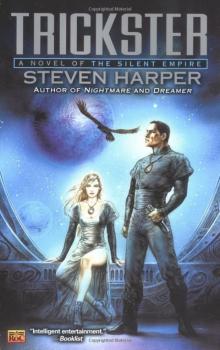 Trickster se-3
Trickster se-3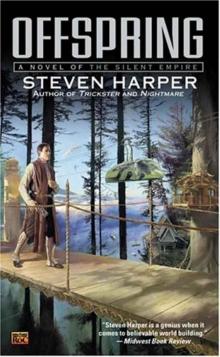 Offspring
Offspring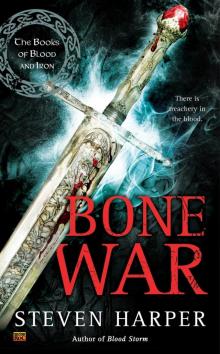 Bone War
Bone War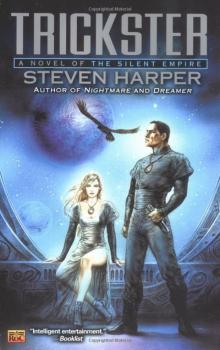 Trickster
Trickster Unity
Unity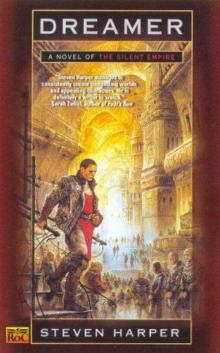 Dreamer
Dreamer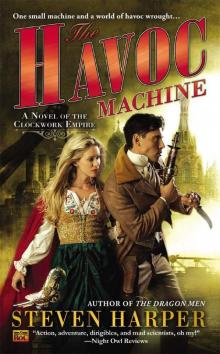 The Havoc Machine ce-4
The Havoc Machine ce-4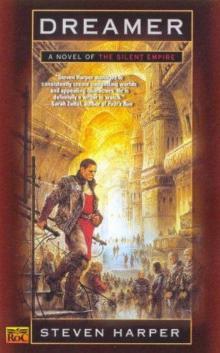 Dreamer se-2
Dreamer se-2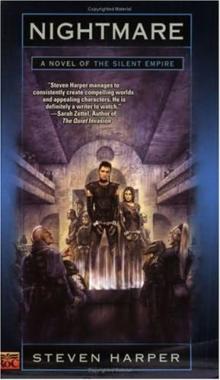 Nightmare se-2
Nightmare se-2